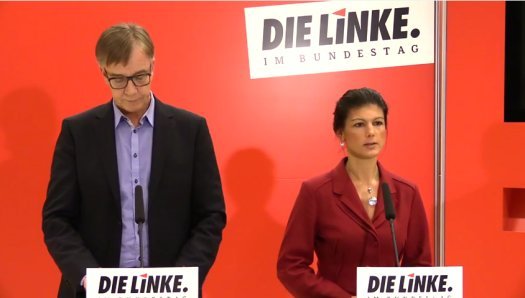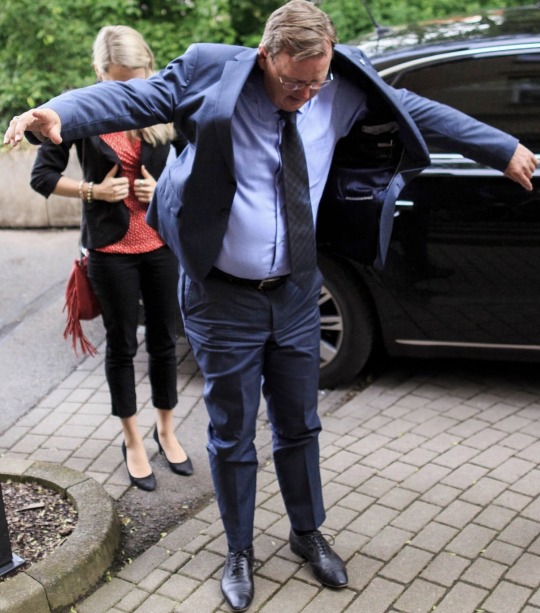#Die Linke
Text

#ukraine#russia#war in ukraine#russian invasion of ukraine#politics#russo ukrainian war#trump#elections#afd#viktor orban#maga#smer#die linke
176 notes
·
View notes
Text
#psychatrieerfahrungen#zukunftsbehandlung#adhsunbehandelt#zukunftsbehand...
youtube
#adhs#unbehandelt#hilfe#sofort#evolution#die linke#linke#die grünen#diegrünen#deutschland#bremen#sozialpsychatrischerdienst#selbstmedikation#sozialsystem#Youtube
21 notes
·
View notes
Text

Bodo Ramelow
#suitdaddy#suiteddaddy#suit and tie#suited daddy#men in suits#suited#suitfetish#waistcoat#three piece suit#suited men#suited grandpa#suitedman#buisness suit#suitedmen#Germany man#german men#deustchland#thuringia#die linke#bodo ramelow
89 notes
·
View notes
Text
James Angelos at Politico:
BERLIN — Listening to Sahra Wagenknecht, Germany’s hard-left icon, you could be forgiven for coming away with the impression that the greatest threat to democracy is “lifestyle leftists” nursing lattes in reusable cups while shopping for organic kale at a Berlin farmers’ market.
Such well-off, eco-friendly urban bohemians hold what they deem to be “morally impeccable” views about everything from Ukraine to climate change, she says, and then impose those beliefs over regular people with draconian zeal.
Wagenknecht — whose recently formed populist party is polling in the double digits ahead of critical state elections in eastern Germany on Sunday — also believes there are too many asylum seekers coming to the country, claiming there’s “no more room.” She reserves much of her ire for Germany’s Greens, blaming their clean-energy push for the country’s deindustrialization, and favors closer relations with Russian President Vladimir Putin.
One of Germany’s most well-liked politicians, Wagenknecht started out in politics as a member of East Germany’s communist party and has long been the face of the country’s hard left. Of late, however, she often sounds positively far right.
Her views and scathing attacks on the mainstream left have, in fact, won her many far-right admirers. Björn Höcke, one of the most extreme politicians in the far-right Alternative for Germany (AfD) and the party’s leader in the eastern German state of Thuringia was so impressed with Wagenknecht — particularly over her position on Putin — that he once called upon her to enlist in the AfD’s ranks. “I implore you, come and join us!” he said last year during a speech in Dresden.
Instead, Wagenknecht has forged a new political force defined by a seemingly oxymoronic ideology she dubs “left conservatism.” In the process, she is upending German politics by chipping away at the crumbling dominance of the country’s mainstream parties and further scrambling the left-right divide that characterized Western politics for most of the 20th century.
As established parties lose sway across Europe, the fractured political landscape makes it easier for political entrepreneurs like Wagenknecht to stake out new territory. That’s increasingly true in Germany too, which has long served as Europe’s anchor of stability — where politics were long relatively staid and predictable.
Long gone are the days when the Volksparteien — big-tent parties — could virtually alone determine Germany’s political course. Upstarts like the AfD and Wagenknecht’s party — dubbed Alliance Sahra Wagenknecht (BSW) — are fomenting a revolt against the political mainstream.
That rebellion is particularly strong in the region that makes up the former East Germany which — despite the more than three-decade effort to absorb and integrate the formerly communist state after the fall of the Berlin Wall — is increasingly following its own parallel political reality.
With three state elections to be held in eastern Germany — in Saxony and Thuringia on Sunday, and in Brandenburg on September 22 — the AfD is leading or close to leading all the contests. Wagenknecht’s new party is polling between around 13 and 18 percent, a striking result for a party that just formed several months ago.
I met Wagenknecht earlier this year backstage at a theater in Berlin, where she was scheduled to answer questions from a reporter from Germany’s left-leaning newspaper Die Tageszeitung before a live audience. Wagenknecht sported her signature look — a jacket with padded shoulders, a knee-length skirt and pumps — a style so invariable she’s often asked about it by reporters. (“Ultimately you get the feeling that it’s a kind of uniform,” the Tageszeitung journalist, Ulrike Herrmann, told Wagenknecht on stage later that night.)
Wagenknecht is far from alone in blurring the traditional left-right spectrum. In the U.S., former President Donald Trump has embraced some traditionally left economic policies on trade and tariffs, partly explaining his appeal to working-class voters. France’s far-right leader, Marine Le Pen, has co-opted economic and welfare policies from the traditional left, attracting, in the process, many former French Communist Party voters.
When I asked Wagenknecht if she saw any similarities between herself and Le Pen or other radical-right parties, a hint of shock seemed to break through her cool, composed countenance. Such parties, she told me, do not truly represent the “so-called little people.” Rather, she said, her brand of politics does — a left that focuses on fighting economic inequality while, as she put it, also embracing social policies that foster “traditions, stability and security.”
That’s territory, she said, the left has mistakenly ceded to the right. “These are quite legitimate human needs, and at some point the left was no longer interested in them,” Wagenknecht told me. She then blamed the rise of the far right on German Chancellor Olaf Scholz and his left-leaning coalition’s “arrogant” approach to governing.
“This is the direct result of an incredible frustration and indignation about wrong policies,” she said. “And the indignation is justified.”
[...]
Yet, in subsequent years, Wagenknecht became an increasingly controversial figure within the Left Party, including when, amid the refugee crisis of 2015, she became a critic of then-Chancellor Angela Merkel’s decision to allow in hundreds of thousands of asylum seekers, using the mantra “Wir schaffen das!” (“We can do it!”). In 2016, after a spate of terror attacks perpetrated by migrants, Wagenknecht released a statement that read: “The reception and integration of a large number of refugees and immigrants is associated with considerable problems and is more difficult than Merkel’s frivolous ‘We can do it.’”
Members of her own party sharply criticized her, arguing that no true leftist should attack Merkel from the right on migration. That year, at a Left Party gathering, a man from a self-described anti-fascist group threw what looked like a chocolate cake topped with whipped cream in Wagenknecht’s face. Relations with many members of her own party grew more strained after Wagenknecht became a sharp critic of the government’s “endless lockdowns” during the Covid-19 pandemic and after Russia’s full-scale invasion of Ukraine, with Wagenknecht frequently appearing on German television to offer takes that echoed Kremlin propaganda.
Finally, last year, she announced that she and a group of Left Party allies would leave to form their own party, with Lafontaine, her husband, also later joining. “We live in a time of global political crises,” she said in Berlin. “And in this of all times, Germany probably has the worst government in its history.” Many people, she added, “no longer know who to vote for, or they vote out of anger and despair.” The choice led to the unraveling of the Left Party, which was forced to dissolve its parliamentary faction, liquidate assets and fire staff.
Wagenknecht has since grown adept at finding a leftist angle for what are commonly rightist stances. Her skepticism of immigration is due, in great part, to her support of the welfare state, which, she says, requires a certain degree of homogeneity to function.
“The stronger the welfare state, the more of a sense of belonging there must be,” Wagenknecht told me in Berlin. “Because if people have no connection to those who receive social benefits, then at some point they will refuse to pay for those benefits.”
Another example was Wagenknecht’s vote against a bill passed by the German parliament earlier this year to make it easier to change one’s legal gender — a law, she said, that would “just be ridiculous if it weren’t so dangerous.” But she found a traditionally left line of attack for that view, targeting the profit-seeking pharmaceutical industry as the main beneficiary of the bill. “Your law turns parents and children into guinea pigs for an ideology that only benefits the pharmaceutical lobby.”
She has also repeatedly called for an end to German military aid for Ukraine and negotiations with Putin — a view prevalent on the far right, but for her, an anti-war stance rooted in the leftist tradition.
That she sounds like the right on these issues brings to mind the “horseshoe theory” of politics, often attributed to the French author Jean-Pierre Faye and his 1996 book “Le Siècle des ideologies,” which holds that political extremes bend towards each other, in the shape of a horseshoe, so that the far left and far right ends are closer together than they are to the center.
But a more concrete explanation for her policies is that Wagenknecht sees a representation gap — a space for people with socially conservative views who are uncomfortable with migration and progressive politics, but are also wary of the AfD’s extremism. Wagenknecht, in other words, seeks to provide a more palatable, anti-establishment alternative.
Wagenknecht, like leaders of other parties, has ruled out governing with the AfD in a coalition. At the same time, she has not, like others, ruled out cooperating with the AfD to pass what she deems to be sensible legislation.
Politico Europe takes a deep dive into the “leftist”-turned-right-wing German politician Sahra Wagenknecht. Wagenknecht formed her own party called Bündnis Sahra Wagenknecht (BSW) that features a mix of far-right and far-left stances.
#Sahra Wagenknecht#Germany#Bündnis Sahra Wagenknecht#Die Linke#Oskar Lafontaine#Central Europe#Europe#World News#Russian Invasion of Ukraine#European Refugee Crisis#Björn Höcke#Alternative für Deutschland#Olaf Scholz
7 notes
·
View notes
Text
about the European elections/voting:
there’s not a single German political party that “won” who wants to recognize Palestine as a state. none of those political party’s election programs even mention Palestine, none of them supported the students demonstrating, none of them are demanding sanctions against Isr@el, none of them have called it a damn genocide.
Die Linke (quite literally translating to the left) and BSW have called for an immediate ceasefire. BSW COULD be in favor of an immediate end to arms deliveries to Isr@el. but in the case of BSW (Alliance Sahra Wagenknecht), this is based on statements by Sahra Wageknecht herself but an official position of the party itself could not be determined.
“Never again” they said.
welcome to Neverland I suppose?
#european elections#european#europawahl#eu parliament#demand a ceasefire#elezioni#europa#parlamento#ue#politica#european voting#JB is thinking#afd#fuck afd#die linke#deutsche politik
12 notes
·
View notes
Text
chat im meeting a bunch of politicians today should i take a picture with the leftists so i can flex later?
2 notes
·
View notes
Text
NUR MIT LINKS: GEGEN SPALTUNG, KRISE & FASCHISMUS
Gemeinsam aktiv. Für eine soziale Politik. In Europa und überall.
Wahlkampfauftakt zur Europawahl

Dienstag, 2. April 2024
18:00 bis 20:00 Uhr
Klecks-Theater, KinderTheaterHaus Hannover im Alten Magazin,
Kestnerstraße 18, 30159 Hannover
In Europa stehen Wahlen an. Die soziale Ungleichheit nimmt zu - durch hohe Mieten und Lebensmittelpreise können sich viele ihren Alltag nicht mehr finanzieren. Beschäftigte im Einzelhandel, bei der Bahn und im Flugverkehr streiken für bessere Arbeitsbedingungen.
Gleichzeitig diskutiert die Politik über Einschränkungen des Streikrechts. Während die Ausgaben für Bildung oder Soziales immer weiter sinken, sollen die Ausgaben für neue Waffen und Aufrüstung weiter steigen. Nazis sitzen in Parlamenten. Die Verschärfungen an den EU-Außengrenzen nehmen zu.
Wir haben Ines Schwerdtner, ehem. Chefredakteurin des Jacobin-Magazins und Kandidatin für das Europaparlament, Alexander Kaps, Betriebsratsmitglied bei edeka und Aktiver in der Streikbewegung im Groß- und Einzelhandel, Tobias Kunze, Autor und Slam-Poet und Aktive der Seebrücke Hannover eingeladen, um gemeinsam zu diskutieren, unsere Kämpfe zu verbinden und aktiv zu
werden.
Was läuft politisch schief? Wie stoppen wir gemeinsam den Rechtsruck? Was sind linke Perspektiven, Utopien und Forderungen für ein Europa für alle?
2 notes
·
View notes
Text

3 notes
·
View notes
Text

Urgh.
#ach sarah#politik#die linke#sarah wagenknecht#german stuff#diese liebe der internationalen linken zu diktatorischen staaten ist einfach so widerlich
6 notes
·
View notes
Text

https://taz.de/Spaltung-der-Linken/!5935275/
Wir leben wirklich in der dümmsten Zeitlinie...
#wagenknecht#sarah wagenknecht#die linke#destiel#was zum fick!?!?!#dean muss glauben nochmal hitler töten 😅#🥲#Deutschland#Deutsche Politik#Bundestag
5 notes
·
View notes
Text
Grün, woke, neoliberal: Linke flüchten vor politischer Assimilation
Die deutsche Linkspartei zerlegt sich, das Bochumer Wagenknecht-Lager prescht bei der Spaltung schon einmal vor. Der Schritt ist unausweichlich, denn links ist an der Partei fast nichts mehr. Wie schon SPD und Grüne hat auch sie sich einer neoliberalen Front angeschlossen. Eine Analyse.
Von Susan Bonath
Nach jahrelangen Lagerkämpfen ist Die Linke in der politischen Bedeutungslosigkeit…

View On WordPress
3 notes
·
View notes
Text
#unbehandelt#suizidgefärdeten#leiderdorp #leid #adhs #adhscommunity #adh...
youtube
#unbehandelt#evolution#die linke#linke#die grünen#diegrünen#deutschland#sozialpsychatrischerdienst#bremen#sozialsystem#selbstmedikation#hilfesofort#gesundheitsreformnötig#dummeärzte#psychatrie#ärztesindlügner#Youtube
5 notes
·
View notes
Text

Bodo Ramelow
#suitdaddy#suiteddaddy#suit and tie#suited daddy#men in suits#silverfox#suitfetish#suited men#suited grandpa#suitedman#suit daddy#suited man#buisness suit#suitedmen#german man#german men#deustchland#die linke#thuringia#Bodo Ramelow
34 notes
·
View notes
Text
Einfach mal lesen, WENN euch das Thema interessiert.
Alle anderen scrollen bitte umgehend weiter. Der Text ist schwer zu verstehen.
5 notes
·
View notes
Text
ok. leute aus berlin, wählt bitte nicht die AfD, weil ihr enttäuscht über Lützerath seid, nur weil da “Alternative” drin steht. ok? die sind rechtsextrem und rassistisch. ok!
(Kontext: hab gerade eine Grafik gesehen, in der die AfD 15% hatten, wenn jetzt gerade gewählt werden würde (Umfrage))
3 notes
·
View notes
Text
Das Ding mit den Gewerkschaften
Gewerkschaften haben es nicht immer leicht - und hatten es auch noch nie leicht. Ihre Entstehen ist eine Geschichte von Spießroutenläufen, Positionskämpfen und Repression bishin zur Strafverfolgung. Umso unverständlicher, dass sich auch in Krisenzeiten wie den jetzigen so viele Menschen an die Stammtischparolen aus reaktionären Kreisen zu Großvaters Zeiten klammen und unterstellen, Gewerkschaften seien nutzlos und überhaupt Verbrecher, die Jobs gefährden.
Schon immer waren es Gewerkschaften, die massiv um Frieden, um Gleichheit und Offenheit bemüht waren und vor allem darum, dass Menschen überhaupt die Zeit dafür haben, abends am Stammtisch zu sitzen und das Geld, die Zeche für den Abend zu zahlen.
Ohne Gewerkschaften sähe das anders aus. Schauen wir uns Äußerungen und Positionen von Arbeitgeberverbänden an oder die Art und Zahl der Prozesse, die Betriebsräte gegen ihre die Firmen führen müssen, in denen sie die Interessenvertretung der Belegschaft stellen, zeigt sich, dass der Alltag jedem gewerkschaftlichen Aufruf Recht gibt.

Das Bewusstsein darüber, dass Gewerkschaften und nicht der Kapitalismus der Motor für arbeitsmarkbezogene Innovationen und bessere Arbeitsbedingungen nicht auf uneigennützigiger Veranlassung von von Investoren getriebene Großkonzernen erfolgte, ließ mich verstehen, dass es aktive Gewerkschaften auch heute braucht. Als außerparlamentarische Opposition, direkt dort, wo es dem System weh tut, kann sie, die Gewerkschaftsbewegung, entscheidende Änderungen durchsetzen, noch bevor es die politischen Gremien aufgrund komplizierter Mehrheitsverhältnisse auf die Reihe bekommen haben und der schwerfällige Koloss in Bewegung kommt. Für eine verbindliche, nachhaltige Umsetzung bedarf es jedoch eben auch gesetzgeberischer Möglichkeiten.
Was hat das mit Linker Politik zu tun?
Linke Politik muss somit immer Hand in Hand mit gewerkschaftlicher Arbeit gehen. Die Gewerkschaft ist keine Konkurrenz zum eigenen Programm. Im Idealfall ist das Interesse der Gewerkschaft eine Ergänzung zu linkspolitischen Positionen und Vorstellungen, wie auch linke Politik als Ergänzung zu gewerkschaftlichen Interessen verstanden werden muss.
Arbeitskampf ist auch immer ein Kampf gegen die bestehenden Verhältnisse, dagegen dass "die da oben" nach unten treten, also die kleinhalten wollen, die die Glastempel, Luxuskarossen und Swimmingpools mit Poolbar durch ihren täglichen Einsatz am Arbeitsplatz ermöglichen - und somit letztlich finanzieren. Arbeitskampf ist auch ein politischer Kampf. Ja, "politischer Streik" ist, wie Jan Korte richtig feststellte, in Deutschland verboten, wie auch in Dänemark. Im Rest der EU ist es ein erlaubtes Mittel. Machen wir uns dabei bewusst: Unsere Interessen stehen denen der allermeisten Gewerkschaften nicht entgegen. Somit ist auch in Deutschland jeder Streik ein politischer Streik
Deswegen bin ich Mitglied bei DIE LINKE. im Rheingau-Taunus-Kreis, bei ver.di und unterstütze die Arbeit von Gewerkschaften, lese, teile, hinterfrage und ergänze, was Gewerkschaften so tun, wie auch, was meine Partei tut.
2 notes
·
View notes